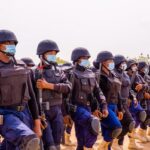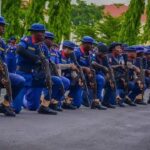Despite several armed attacks on schools over the years, it is disturbing that thousands of schools in the country are still susceptible to such attacks. The Commandant General of the Nigeria Security and Civil Defence Corps (NSCDC), Ahmed Audi, on Tuesday last week, said the corps had undertaken a vulnerability survey on schools to enable it devise strategies that would secure them. Audi disclosed that there are over 81,000 schools in the country, out of which over 62,000 are open to attacks; adding that most of the affected schools are government-owned.
The NSCDC boss made these revelations at the maiden Commandant General’s Conference where he also announced that the corps’ female squad has been established to secure school environments and protect children who have become targets of attacks by bandits and kidnappers.
- Police rescue robbery attack victim in Akwa Ibom
- Tegina pupils: Parents beg for money in Churches, Mosques as bandits reduce ransom
He said the survey was meant to enable NSCDC “to effectively secure our school environment as part of effort towards achieving the Safe School Initiative (SSI) of the federal government.”
While calling for synergy among security agencies in the country, Audi emphasised that citizens must be part of the synergy in order to contain rising insecurity.
In the past few years, boarding schools have become soft targets to attacks by bandits, kidnappers and other criminal elements. Government’s inability to contain the surge of insecurity has carelessly helped to sustain abduction for ransom.
The first case of attack on a school where 276 students were abducted on April 14, 2014, involved GSS Chibok in Borno State. Recent incidents include the abduction of Islamiyyah schoolchildren from Tegina town in Niger State, which came 14 days after the release of students who spent 40 days in captivity following their abduction from Greenfield University in Kaduna State.
Students and teachers were also kidnapped in the attacks on Government Technical College (GTC), Rijau, Niger State; Model School, Igbonla, Lagos State; GGSTC, Dapchi, Yobe State – where Leah Sharibu has since February, 2018, remained in captivity; Maiduguri Capital School, Borno State; Engravers College, Kakau Daji, Kaduna State; Government Technical School, Kajuru, Kaduna State; Good Shepherd Major Seminary, Kakau, Kaduna State; Prince Academy Secondary School, Damba-Kasaya, Kaduna State; Ohorhe Secondary School, Delta State; Government Science Secondary School, Kankara, Katsina State; and GSC Kagara, Niger State.
It is most unfortunate that we still have as many as 62,000 unsafe schools. This shows clearly that no lesson has been learnt from all the attacks on schools.
Therefore, it is a good thing that the NSCDC boss has given out this information; and what is done with it will determine to a great extent the future of education in the country. We do not have to wait for another attack and then make speeches or shut down the school; as that can only be a temporary solution. The time to act is now.
Most schools lack perimeter fence, therefore, the first step would be the provision of perimeter fencing, then deployment of security operatives. The cost of securing schools cannot be more expensive, if corruption were not involved, than the consequential cost of the attacks.
It would be recalled that in February this year, the senate had to mandate its committees on education (basic and secondary), as well as tertiary institutions and TETFund, to investigate the utilisation of over $20m budgeted for SSI. The investigation was also to cover all monies donated by foreign governments and agencies to the initiative. SSI was launched by the federal government in 2014 to “promote security and safety of schools, pupils, students, teachers, as well as facilities.” The report of this investigation is being awaited. We call for its release so that action can be taken.
Unless government shows sufficient political will and commitment to securing schools, Abubakar Shekau’s mission of shutting down schools to stop Western education may come to pass. Government must, therefore, do everything possible to make schools in the country safe and fortified against attacks.

 Join Daily Trust WhatsApp Community For Quick Access To News and Happenings Around You.
Join Daily Trust WhatsApp Community For Quick Access To News and Happenings Around You.


